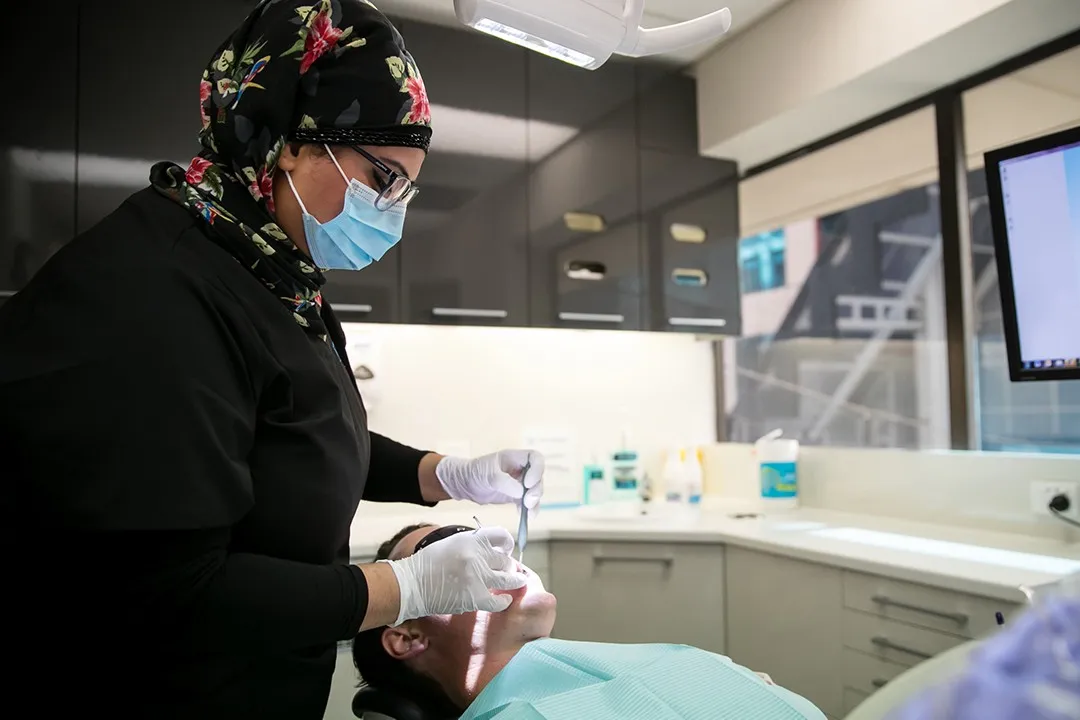Gum (Periodontal) Disease
Have you ever noticed:
- Bleeding gums
- Loose or mobile teeth
- Tartar build-up
- Bad breath
- Receding gums, giving the appearance of long teeth?
- These are signs that you may be suffering from Periodontal disease

The word periodontal means ‘surrounding a tooth’. Periodontal disease (more commonly known as gum disease) attacks the tissues, bone and ligaments supporting your teeth. It is a common cause of tooth loss in adults and can often affect people while presenting no discernible symptoms.
Periodontal disease is caused by bacteria from plaque that spread down into the gumline of our teeth and cause inflammation in the gums. This early gum inflammation is called gingivitis and is associated with redness and bleeding when we brush or floss our teeth. Gingivitis and is an easily treatable condition with reversible effects.
However, if gingivitis is not detected and treated, the inflammation of gingivitis continues and becomes chronic. The bacteria can continue migrate further down the tooth roots and underneath the gumline until eventually, more than just the gums are involved.
The jawbone surrounding our teeth can become affected as well. This is called periodontitis and is characterised by bone loss around the teeth. With bad smelling bacteria, plaque and tartar (or calculus) residing deep under the gum line, bone loss continues with time. This damage cannot be reversed once sustained. The affected teeth can become loose or mobile and ultimately, they are lost.
There is usually no pain associated with gingivitis or periodontitis, so it is hard to know if you are affected. However, bleeding gums, tartar buildup, gum recession and bad breath may all be signs of periodontal disease. If you have experienced these signs, it is best to have check up with one of our dentists or hygienists at NSDP. Our new patient packages include a thorough gum health assessment as well as preventative care advice to help manage your gum health.
Treatment of Periodontal Disease
With problems such as recurrent infections, usually the best solution is wisdom teeth removal*. Wisdom teeth removal is a relatively common procedure, carried out on many patients.
The treatment for both gingivitis or periodontitis is straightforward: regular and thorough professional cleaning of the teeth and infected gums and maintenance of excellent home oral hygiene care. Basically, if the bacterial cause of the inflammation is removed, the disease will stop.
However, it is not always easy. Once bone is lost, is very difficult to regenerate. The damage of bone loss is often irreversible and can lead to teeth becoming loose and eventually lost. For this reason, prevention of the bone loss associated with periodontal disease is the best approach. This can be achieved with regular professional dental cleaning by one of North Sydney Dental Practice’s skilled dental hygienists.
Is Periodontal Disease linked to our general health?
Research has also proved that periodontal disease is directly linked to our general health and if left untreated can increase risks of developing more serious conditions such as heart disease, cardiovascular disease, respiratory conditions and diabetes. This highlights the importance of regular dental exams to help detect and treat periodontal disease before it escalates.
Prevention of Gum Disease
Early detection is important in the fight against periodontal disease. Almost all adults will suffer from the disease at some point in their lives. The risk can be minimised by maintaining a thorough oral hygiene routine and regular six monthly visits to the dentist for a professional clean and examination. Once the disease is present, it is important to receive treatment from your dentist to halt the progress of the infection.
Periodontal Treatment Sydney
If you are experiencing any of the symptoms described above, contact North Sydney Dental Practice to arrange a consultation.
